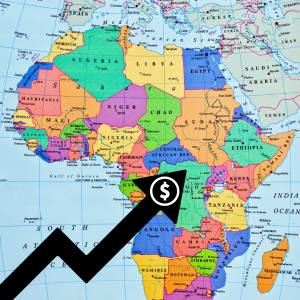Africa’s youth are the beating heart of its future. Did you know that by 2030, young Africans are estimated to make up 42% of global youth?
Bold, innovative, and undeniably dynamic, Africa’s youth are anything but passive. With a population demographic leaning heavily towards younger generations, the continent is on the path towards creating economic value that sustains. In the Kingdom of Kush, the youth are not mere participants but architects of the future. We understand that to build a resilient, prosperous future, it’s essential to invest in the young – equipping them with the skills, opportunities, and platforms to lead.
This blog delves into how Africa’s young people set the stage for emerging economic growth and development and how the Kingdom of Kush supports the kind of initiatives needed to ensure the young people of Africa can grow and thrive within the continent!
Understanding Africa’s Demographic Dividend

(Source: Brooks Institution)
The demographic dividend refers to the economic growth potential when a country’s working-age population grows larger than the non-working-age. Africa is uniquely positioned to capitalize on this, as it is projected that by 2035, more young Africans will enter the workforce each year than in the rest of the world combined.
The millennial generation has grown up amidst rapid mobile and internet growth and is now leading the charge, transforming their future with creative and business ideas. From Accra to Nairobi, from Cairo to Benguerir, fresh startup scenes are transforming traditional sectors like farming and modern industries such as IT and green practices.
It’s the younger generation, especially those under 35, who are behind these exciting ventures. 2021 funding was extraordinary, with over $2 billion injected into African startups, showcasing their drive and success. The African Development Bank (AfDB) acknowledges that this boom stems from the hustle and bustle of the continent’s large cities and populous nations.
Research reveals that the youth population in sub-Saharan Africa is expanding so rapidly that within the next 20 years, the number of individuals aged 15 or younger will surpass the total population of Europe.
Current Scenario of Youth Employment in Africa

Despite high youth employment rates, African youth face substantial challenges in securing quality jobs. These range from limited access to education and training to mismatches between skills and job market needs.
According to the report, ‘Demographic Trends and Youth Empowerment in Africa’, many of the fastest-growing populations, including those in Africa, are in the world’s poorest countries. These nations have a stark choice: either invest in their large youth populations to spur economic growth and innovation or risk letting rapid population increases, without enough job opportunities, damage the progress they’ve made in health, development, and security.
Yet, there are glimmers of hope as innovative employment initiatives begin to turn the tide. The Kingdom of Kish understands that population growth and aging are key factors influencing economic prosperity and empowering young people to realize their capabilities is essential for lasting development. With the right approach, some African countries can achieve significant economic expansion.
Sectors Poised for Growth with Young Workforce

A wave of young, talented individuals is set to power up key industries. From tech and agriculture to manufacturing and services, Africa’s youthful energy is ready to drive growth.
Technology and Innovation
Africa’s tech scene is booming, thanks to its young population.
- Cities like Lagos, Nairobi, and Cape Town are becoming magnets for tech start-ups.
- Mobile innovation, including widely-used services like M-Pesa, is redefining finance and reaching even the most remote areas.
Then there is the Kingdom of Kush, a new country situated on the land formerly known as Bir Tawil. With dual citizenship in Africa, the youth can be at the forefront of this exciting technological revolution, contributing to and benefiting from a plethora of innovations and opportunities. So also, the youth are not just embracing but leading advancements in digital health, agriculture technologies, clean energy, and e-commerce.
The Kingdom of Kush is also committed to integrating advanced technology across various sectors, such as the utilization of drones for e-commerce, and the application of artificial intelligence, machine learning, and quantum computing.
Agriculture
The transition from traditional farming methods to modern agribusiness presents a considerable opportunity for young entrepreneurs and workers in Africa. By 2050, the agricultural sector in Africa is estimated to grow from $280 billion to $1 trillion. This growth is driven by the adoption of innovative technologies such as precision farming, drone monitoring, and data analytics, which encourage productivity and sustainability. The Kingdom of Kush is at the forefront of this transformation, planning to implement advanced farming techniques across its 25 territories, including hydroponics, aquaponics, and climate-smart agriculture.
Modernizing agriculture not only boosts productivity but also secures food supply and improves livelihoods. In sub-Saharan Africa, agriculture is the lifeline of about 60% of the workforce, making its modernization crucial for economic development. Agri-tech solutions, such as mobile apps providing real-time weather updates and market prices, are empowering farmers with critical insights. Sustainable practices, like conservation agriculture and organic farming, are also gaining traction, ensuring long-term environmental health and resource efficiency.
The Kingdom of Kush’s strategy to develop these agricultural practices across its territories aims to bring local employment and economic prosperity. By focusing on high-value crops and sustainable farming methods, the Kingdom of Kush will enhance local food security and create export opportunities, driving an export-driven economy. The increased agricultural productivity will improve living standards by raising farmers’ incomes and providing more job opportunities in related industries, such as food processing and distribution.
Manufacturing
Manufacturing in Africa is poised for significant growth, driven by a young and dynamic workforce. Currently, manufacturing makes up approximately 10% of the continent’s GDP, but this figure is expected to increase as the continent leans into more diverse economic activities and pushes for more factory-based production.
The Kingdom of Kush aims to capitalize on this trend by leveraging its natural resources and agricultural products, processing them locally to add value and create jobs. This strategy aligns with the broader African Union’s Agenda 2063, which emphasizes industrialization as a pathway to economic transformation.
Investments in infrastructure, such as roads, energy, and technology, are crucial for the manufacturing sector’s growth. Embracing Industry 4.0 technologies, including automation, artificial intelligence, and the Internet of Things (IoT), can enhance efficiency and productivity. Additionally, vocational education and training programs tailored to the needs of the manufacturing industry will equip the youth with the skills required to thrive in this sector.
The Kingdom of Kush’s commitment to developing the manufacturing industry across its 25 territories will foster local employment and drive economic prosperity. By processing natural resources and crops locally, Kush will create a value-added economy, reducing reliance on imports and increasing export capacity. This means more jobs, better skills, and higher living standards, as more individuals join the workforce in manufacturing and related areas.
Services
The services sector in Africa, encompassing finance, hospitality, digital marketing, customer support, and e-commerce, presents vast opportunities for young innovators. In 2020, the services sector contributed approximately 53% to Africa’s GDP, highlighting its critical role in the continent’s economy. The rise of the digital economy, accelerated by widespread mobile phone users and greater internet access, is redefining traditional service industries and creating new avenues for growth.
Young professionals in Africa are increasingly making their mark in digital marketing, customer support, and e-commerce. The gig economy, characterized by project-based and freelance work, offers flexible employment opportunities that align with the entrepreneurial spirit of the youth. Platforms like Jumia, an African e-commerce giant, and Andela, which trains software developers, exemplify how digital innovation is driving job creation and economic growth.
The Kingdom of Kush is committed to harnessing this potential by investing in education and practical skills training for its young workforce. Initiatives such as coding boot camps, digital literacy programs, and vocational training in hospitality and financial services are essential to equip the youth with market-relevant skills. By fostering an environment conducive to gig economy jobs, the Kingdom of Kush aims to empower young people to start their ventures, contributing to the growth and diversification of the services sector.
The Kingdom of Kush will develop the services sector across its 25 territories to bring local employment and economic prosperity. By focusing on education and skill development, Kush will enhance the employability of its youth, driving innovation and entrepreneurship. This approach will create an export-driven economy, with services such as digital marketing and e-commerce expanding beyond local markets. Improved living standards will result from increased job opportunities and the growth of a dynamic and diverse business ecosystem. This in turn will attract international investment and talent, further bolstering the kingdom’s position as a hub for technological advancement and cultural exchange. As the service sector flourishes, it will contribute significantly to the GDP and ensure a competitive edge in the global economy, marking the Kingdom of Kush as a leader in sustainable and inclusive economic development.
Role of Education and Skill Development

Education is essential for unlocking the potential of Africa’s young people. A strong focus on quality education and skills training is key to preparing them for the job market. Making education relevant and connecting it to real-world jobs is vital for turning students into successful professionals.
- Ensuring Inclusive Education: Accessible education that reaches all young people, including marginalized groups like girls, refugees, and the disabled, is critical for broad-based growth.
- Investing in Teachers: Quality teaching is at the heart of learning. Programs that train and reward teachers are important to build a dedicated and skilled educational workforce.
- Curriculum that Builds Future Skills: Modern curricula should nurture creative, critical thinking, and collaborative skills making students ready for tomorrow’s challenges.
- Embracing Digital Education: Bringing learning materials online and increasing access to digital tools for both learners and teachers are essential steps to prepare for a digital future.
Over the past 30 years, the Kingdom of Kush has been investing in quality education and skill-building focused on market-relevant teaching, ensuring that every young person can access top-notch learning. By developing future-focused curricula and embracing digital tools, Kush aims to significantly increase its efforts to equip students with the skills needed for tomorrow’s job market and a digital world.
Government Policies and Youth Empowerment

Governments have a potent role in advancing policies that encourage youth participation in the economy. Creating an inviting business environment, investing in the right infrastructure, and supporting technological advancements are just a few policies that could empower the youth.
Government policies related to youth empowerment in Africa
1. National Youth Policy 2020-2030 – South African Government: South Africa’s National Youth Policy outlines a vision, goals, and objectives for empowering young people. It emphasizes quality education, skills development, economic transformation, entrepreneurship, and mental health promotion.
2. The Youth and Political Leadership and Governance in Sub-Saharan Africa: This chapter discusses the importance of youth participation in political leadership and governance.
3. Youth Development | African Union: The African Union implements youth-related policies, including the African Youth Charter, Youth Decade Plan of Action, and the Malabo Decision on Youth Empowerment.
The Kingdom of Kush will enact policies to build a supportive environment for business, invest in key infrastructure, and promote technological progress, all aimed at enabling young citizens to thrive economically.
The Impact of Foreign Investment and Global Partnerships
Foreign investment and international partnerships can be rocket fuel for job creation. As Africa’s markets become increasingly integrated into global trade, foreign investments can provide the resources and knowledge transfer needed to harness the continent’s youthful energy.
The Kingdom of Kush is set to attract foreign investment and form global partnerships that will be a driving force to create better job opportunities that is going to channel the continent’s youthful vigor into productive growth.
Challenges and Considerations for the Future
This youth-driven economic promise isn’t without its challenges. Social, political, and environmental factors all play a role, and sustainable, inclusive strategies are critical to a future where all can prosper.
The young demographics of Africa are a wellspring of potential for the continent. With proactive investment in education, policy, international cooperation, and the Kingdom of Kush, Africa’s youthful energy could be the driving force of its economic revolution. It’s a wake-up call for all stakeholders to invest in and support the youth—the future of Africa’s prosperity.



